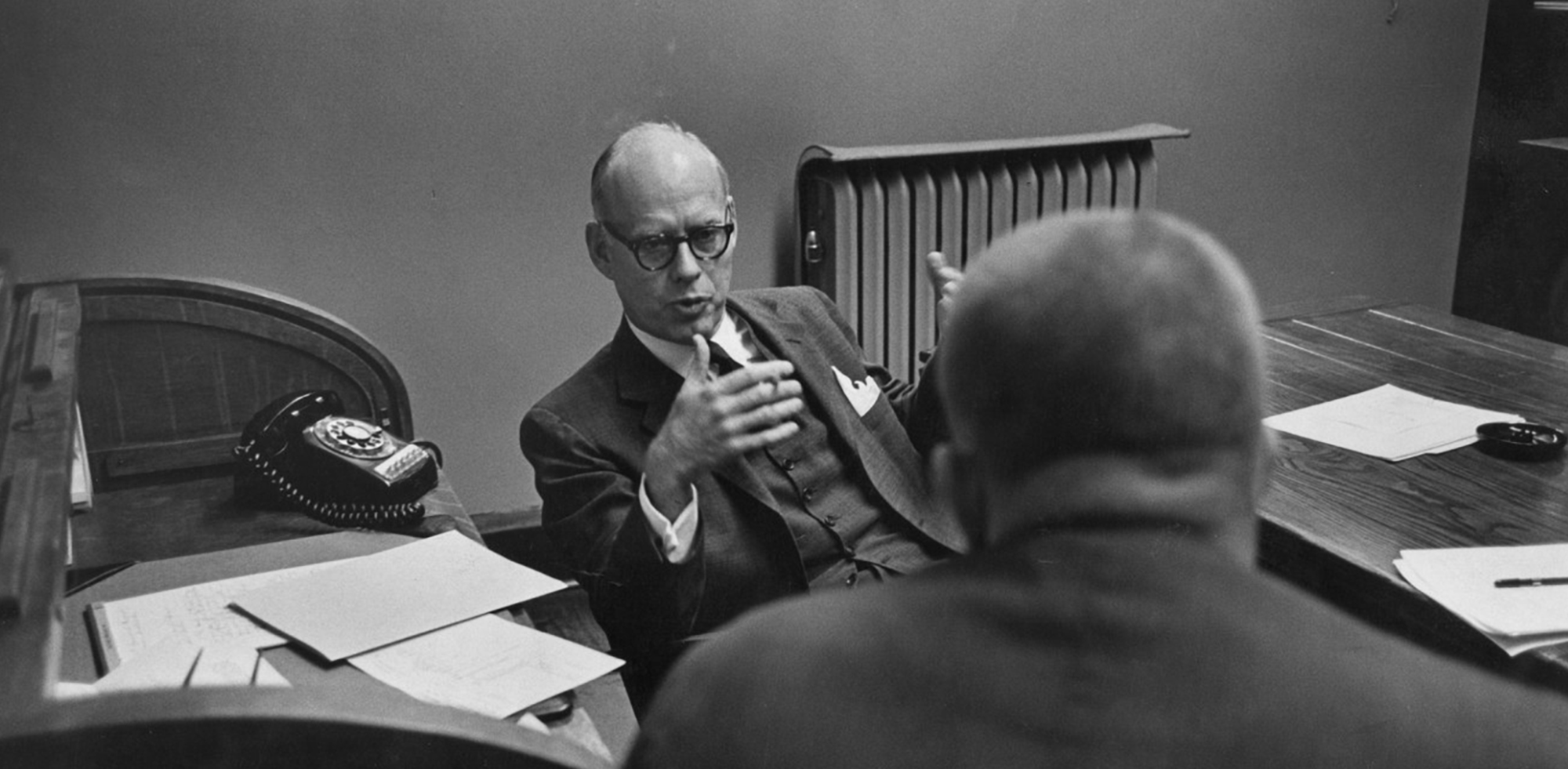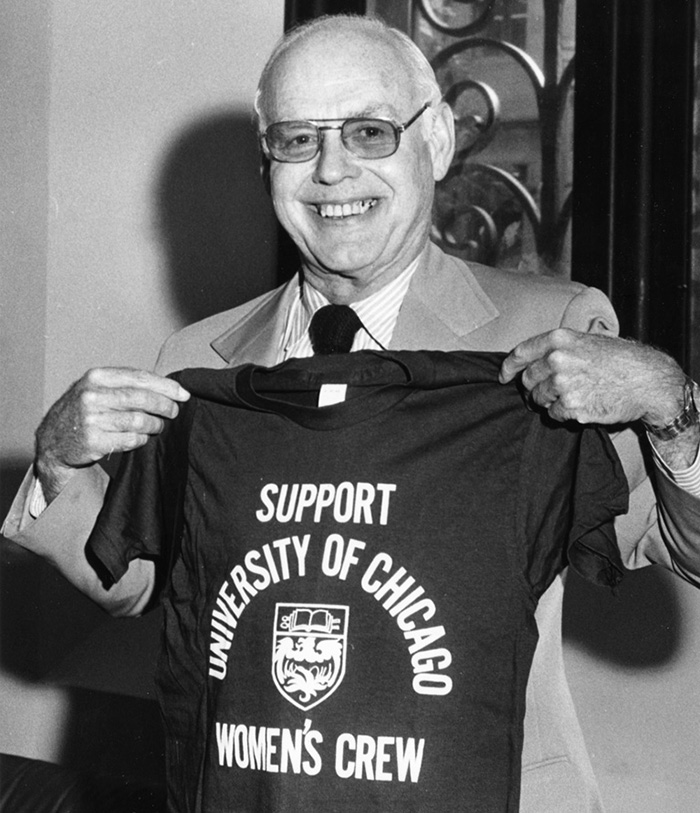
(Photo courtesy Karlyn Metcalf)
From the print archive: The man who inspired the Metcalf Internship Program.
Over the past 15 years, Jeff Metcalf has become one of the best-known names in the College. Since the Jeff Metcalf Internship Program was established in his honor in 1997, more than 2,000 College students have won “Metcalfs”—paid, substantive internships during summer break.
The program was founded by Byron Trott, AB’81, MBA’82, along with other lead donors, in honor of Harold R. “Jeff” Metcalf, AM’53, dean of students in the Graduate School of Business (1956–75) and the University’s athletic director (1976–81). Metcalf died in 1994.
“He was a great man. He was just a great man,” says Trott, a varsity football and baseball player who knew Metcalf when he was athletic director. “He connected with people, found out what they were made of, and then helped.”
Metcalf encouraged Trott to study business and—back when career guidance for College students was all but nonexistent—used his vast network of contacts to help Trott and others find summer jobs. “He wouldn’t get you the job. He would get you the interview,” says Trott, now chairman and CEO of BDT Capital Partners and a University trustee. “He was his own little placement office. If it weren’t for Jeff Metcalf, I would not be in the career I am in now.”
The internship program is not the only thing at the University named in Metcalf’s honor. In 1994, more than 100 alumni and staff made a collective gift to name the lobby of the Gleacher Center for Metcalf. “I think only three people turned us down,” says co-organizer Fred Sweeney, MBA’66, who served as one of Metcalf’s assistant deans. “He was more than the students’ dean,” reads the dedication on the lobby wall. “He was their mentor, their advocate, and their friend.”
What kind of man inspires that level of devotion? What was Jeff Metcalf really like?
The College Newsletter spoke with Karlyn Metcalf, his wife of 34 years, who shared her memories and a lighthearted 1966 Sun-Times article about her husband, “The Dean and a Ramos Fizz.” The picture that emerges is of a man who was deeply intellectual, funny, gregarious, kind, and, in the University of Chicago tradition, a little idiosyncratic. Here are a few things we discovered.
His name wasn’t Jeff.
Born Harold R. Metcalf, he acquired his understated nickname in the Marines, after his unit watched the 1941 film noir Johnny Eager. The character Jeff, Johnny Eager’s best friend, “was a college man who had fallen under the influence of evil companions and spirituous beverages,” Metcalf told the Sun-Times. “When the lights came up, there were fingers pointing at me from all directions. And I have been known as Jeff ever since.” Even Karlyn thought he was called Jeff: “I didn’t know his real name until we went to get our marriage license.”
Despite several close calls, he never earned a college degree.
“He was the 89th member of his family to attend Oberlin College,” says Karlyn. During Metcalf's first semester, the Japanese attacked Pearl Harbor, and he joined the Marines. “He thought the Marines were the best trained, so that was the safest place to be.”
While serving in the South Pacific, Metcalf received an appointment to the Naval Academy from Harry S. Truman, then a senator from Metcalf’s home state of Missouri. Metcalf was given leave to go, as long as he could arrange his own transportation. “So I stole a rubber boat and outboard,” he told the Sun-Times. He managed to hail a passing ship, but it broke down. When he finally arrived, it was too late.
Instead Metcalf enrolled in the V-12 Navy College Training Program at the University of Southern California. His career there ended abruptly after a university official gave a speech against President Roosevelt, whom Metcalf considered his commander-in-chief. “I jumped up in the middle of the speech and yelled ‘dismissed’ to my troops. Then I walked out,” he told the Sun-Times. “It was a little embarrassing, due to the fact that nobody followed me.” Metcalf was expelled and sent back to the Pacific.
(After the war, he was admitted to graduate study in history at the University of Chicago on the basis of an examination; he earned a master’s degree in 1953.)
He was a member of the famed Carlson’s Raiders.
In World War II, Metcalf served in the Second Marine Raider Battalion, the light-infantry attack force headed by Colonel Evans Fordyce Carlson. The unit, made famous by the 1943 film Gung Ho, was unconventional (Carlson modeled its organization on the Chinese Communist army) and terrifyingly successful. Metcalf fought in the Battle of Midway and the Battle of Guadalcanal, where his battalion annihilated a Japanese regiment that outnumbered them two to one. “It was very scary stuff,” says Assistant Dean Sweeney. “He never, ever talked about it.”
After Metcalf was expelled from USC, “he was supposed to be part of the invasion of Japan, but that never happened because the Japanese surrendered,” says Karlyn. “The atomic bomb probably saved his life.” Metcalf ended the war as an MP in charge of the red-light district in Nagasaki.
He roomed with all kinds of famous bohemians.
When the war ended, “the brother of a high school friend was renting this big old house in Big Sur,” says Karlyn. “Much to his surprise, Salvador Dalí was one of the people staying there, as well as D. H. Lawrence’s widow, the swami Krishnamurti, and Henry Miller. It was a quite a crew. Apparently they took turns cooking and cleaning.”

His marriage began like a romantic comedy.
“We met in 1953, I believe,” says Karlyn. It was her first day working at a market research company, Market Facts, and Metcalf’s last. “I thought, who is this fellow? He’s wearing a beret,” she says. “Somebody said, ‘He’s at the University of Chicago.’ I said, ‘Well, that figures.’” And she didn’t see him again for seven years.
Then, in May 1960, Metcalf was called to jury duty downtown. He came into the LaSalle Street office to see if any of his old colleagues wanted to have lunch. Most of the people he knew had already left for lunch, “and I was there, so he asked me,” says Karlyn. “We got engaged in July and married in September.”
He had no business training.
In 1954, Metcalf left the PhD program in history (his unfinished dissertation was on mountain men of the West) to take a position as assistant dean of students in the Graduate School of Business. He was appointed dean of students in 1956 and served for nearly 20 years. “He enjoyed everything about the job,” says Karlyn. “He was a people person. He really enjoyed recruiting. He was one of the first recruiters to visit women’s colleges, with some little prodding from me. He also went to black colleges to recruit minorities.” In 1970, he became a founding member of the National Black MBA Association.
He was not particularly athletic.
Metcalf was appointed athletic director in 1976; he had been on a search committee to fill the position, and the committee selected him. “He enjoyed golf, but he was not a very good golfer,” says Karlyn. “I think he ran track in high school.”
“At the University of Chicago, being athletic director was not a power seat,” says Trott. “But he took it very seriously. He would go on football trips on the bus, there and back. He was a great mentor and a great guidance counselor for us. He would go have a beer at Jimmy’s with us. Jeff was the guy that you could talk to.”
He was a co-owner of the legendary Hyde Park bar, the Eagle.
In 1965, Metcalf and three partners opened the Eagle, a tavern and restaurant, at 5311 S. Blackstone (where Giordano’s is today). The name was taken from the old music-hall tune turned nursery rhyme: “Up and down the City Road/In and out the Eagle/That’s the way the money goes/Pop goes the weasel.”
The pub was intended to be a quiet place, “where diversion would be supplied by your own talents and power of articulation, rather than the mechanical marvels of the day,” Metcalf told the Sun-Times. “We wanted something informal but not decadent or sloppy or beat.” The Eagle, mentioned by name in Saul Bellow’s To Jerusalem and Back, closed in 1980. It was so beloved that a group of customers still holds an annual remembrance.
He was the second Metcalf to be director of athletics at UChicago.
Metcalf’s uncle, T. Nelson Metcalf, a former football coach at Columbia and Oberlin, was athletic director from 1933 to 1956. (Unluckily for him, his tenure included the year 1939, when the University dropped its football program.) Decades later, after varsity football was reinstated, Jeff Metcalf attended a meeting of the Big Ten, where he suggested with a straight face that the University of Chicago would like to rejoin. The reaction, says Karlyn, was “Huh?”
He loved the University of Chicago.
“He had three great loves: the Marines, and the University of Chicago, and I was in there somewhere,” says Karlyn. “I was never quite sure where I stood in his affections compared to the other two. Possibly third.”
